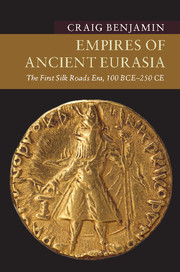Book contents
- Empires of Ancient Eurasia
- New Approaches to Asian History
- Empires of Ancient Eurasia
- Copyright page
- Contents
- Figures and Maps
- Introduction
- 1 Pastoral Nomads and the Empires of the Steppe
- 2 Early China
- 3 Zhang Qian and Han Expansion into Central Asia
- 4 The Early Han Dynasty and the Eastern Silk Roads
- 5 The Roman Empire and the Western Silk Roads
- 6 The Parthian Empire and the Silk Roads
- 7 The Kushan Empire
- 8 Maritime Routes of the First Silk Roads Era
- 9 Collapse of Empires and the Decline of the First Silk Roads Era
- Conclusion
- Bibliography
- Index
- References
1 - Pastoral Nomads and the Empires of the Steppe
Published online by Cambridge University Press: 20 April 2018
- Empires of Ancient Eurasia
- New Approaches to Asian History
- Empires of Ancient Eurasia
- Copyright page
- Contents
- Figures and Maps
- Introduction
- 1 Pastoral Nomads and the Empires of the Steppe
- 2 Early China
- 3 Zhang Qian and Han Expansion into Central Asia
- 4 The Early Han Dynasty and the Eastern Silk Roads
- 5 The Roman Empire and the Western Silk Roads
- 6 The Parthian Empire and the Silk Roads
- 7 The Kushan Empire
- 8 Maritime Routes of the First Silk Roads Era
- 9 Collapse of Empires and the Decline of the First Silk Roads Era
- Conclusion
- Bibliography
- Index
- References
Summary
- Type
- Chapter
- Information
- Empires of Ancient EurasiaThe First Silk Roads Era, 100 BCE – 250 CE, pp. 16 - 41Publisher: Cambridge University PressPrint publication year: 2018

